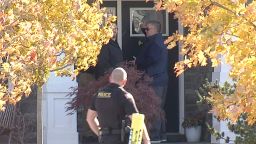Indiana Shooting Sparks Urgent Debate on Stand-Your-Ground Laws

UPDATE: A tragic incident in Indiana has ignited urgent discussions about the implications of stand-your-ground laws following the fatal shooting of Maria Florinda Rios Perez De Velasquez on Wednesday. The house cleaner was killed after mistakenly trying to enter the wrong residence, prompting immediate scrutiny of self-defense statutes that vary significantly across the United States.
Authorities report that the homeowner shot Rios Perez De Velasquez after she attempted to enter a home she believed was scheduled for housekeeping services. This incident raises critical questions about the interpretation and limits of self-defense laws in Indiana, where individuals can use reasonable force, including deadly force, to protect their property. Prosecutors are investigating whether the homeowner’s actions were justified under state law.
Stand-your-ground laws, designed to empower individuals to defend themselves without the duty to retreat, are under intense scrutiny in light of this tragedy. Legal experts note that Indiana’s law may not apply in this case, as it does not cover actions taken against someone who is not unlawfully entering a property.
According to Eugene Volokh, a law professor at the University of California, Los Angeles, these statutes permit individuals to respond to threats with deadly force only if there is a reasonable belief of imminent danger. Critics argue that such laws may encourage unnecessary violence, while supporters, including the National Rifle Association, maintain they are essential for personal safety.
Currently, at least 31 states and territories, including Puerto Rico, recognize some form of stand-your-ground law. New laws were enacted in Arkansas and Ohio as recently as 2021. In states without explicit stand-your-ground laws, courts still allow for the use of deadly force in self-defense under certain circumstances, emphasizing the need for clarity in these legal frameworks.
The debate around these laws has intensified following high-profile cases. Most notably, Florida’s original stand-your-ground law was central to the acquittal of George Zimmerman in the 2012 shooting of Trayvon Martin. The law allowed Zimmerman to claim self-defense after fatally shooting the unarmed teen.
In Texas, the application of the castle doctrine was highlighted in the controversial case of Amber Guyger, a former police officer who mistakenly entered the wrong apartment and killed Botham Jean in 2018. Despite the strong self-defense laws in Texas, prosecutors emphasized that the doctrine did not apply to an unrelated incident in August 2023, where an 11-year-old boy playing “ding-dong-ditch” was fatally shot.
As discussions surrounding stand-your-ground laws continue, lawmakers and citizens alike are calling for a reevaluation of these statutes to ensure they do not inadvertently support acts of violence or racial bias. Following this latest shooting, advocates are urging for stricter guidelines and clearer definitions of self-defense to prevent further tragedies.
What’s Next: As the investigation into this incident unfolds, observers are closely monitoring the response from state authorities and lawmakers. Community leaders are expected to hold discussions on the implications of self-defense laws, highlighting the urgent need for reform in light of this tragic loss of life.
Stay tuned for more updates on this developing story as it unfolds in Indiana and across the nation.






